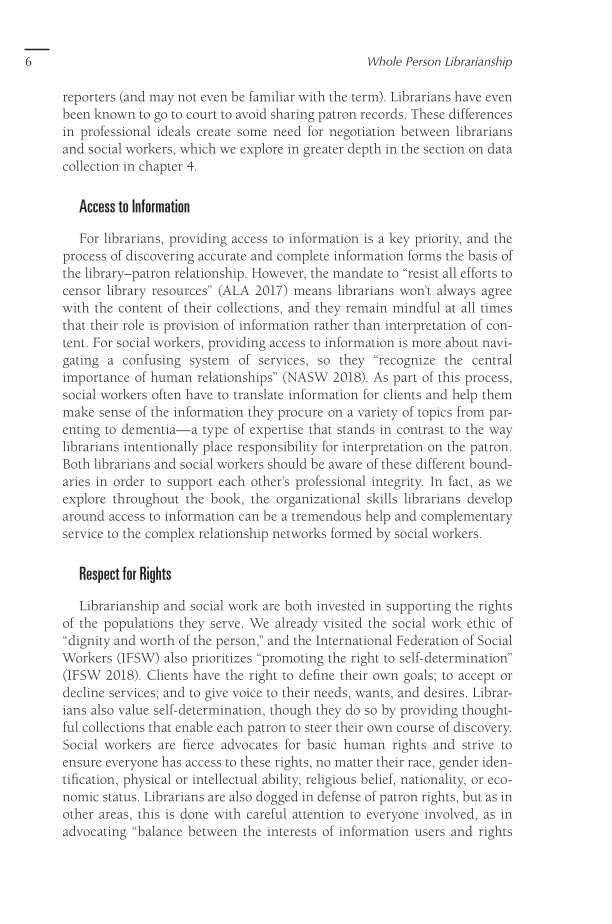6 Whole Person Librarianship reporters (and may not even be familiar with the term). Librarians have even been known to go to court to avoid sharing patron records. These differences in professional ideals create some need for negotiation between librarians and social workers, which we explore in greater depth in the section on data collection in chapter 4. Access to Information For librarians, providing access to information is a key priority, and the process of discovering accurate and complete information forms the basis of the library–patron relationship. However, the mandate to “resist all efforts to censor library resources” (ALA 2017) means librarians won’t always agree with the content of their collections, and they remain mindful at all times that their role is provision of information rather than interpretation of con- tent. For social workers, providing access to information is more about navi- gating a confusing system of services, so they “recognize the central importance of human relationships” (NASW 2018). As part of this process, social workers often have to translate information for clients and help them make sense of the information they procure on a variety of topics from par- enting to dementia—a type of expertise that stands in contrast to the way librarians intentionally place responsibility for interpretation on the patron. Both librarians and social workers should be aware of these different bound- aries in order to support each other’s professional integrity. In fact, as we explore throughout the book, the organizational skills librarians develop around access to information can be a tremendous help and complementary service to the complex relationship networks formed by social workers. Respect for Rights Librarianship and social work are both invested in supporting the rights of the populations they serve. We already visited the social work ethic of “dignity and worth of the person,” and the International Federation of Social Workers (IFSW) also prioritizes “promoting the right to self-determination” (IFSW 2018). Clients have the right to define their own goals to accept or decline services and to give voice to their needs, wants, and desires. Librar- ians also value self-determination, though they do so by providing thought- ful collections that enable each patron to steer their own course of discovery. Social workers are fierce advocates for basic human rights and strive to ensure everyone has access to these rights, no matter their race, gender iden- tification, physical or intellectual ability, religious belief, nationality, or eco- nomic status. Librarians are also dogged in defense of patron rights, but as in other areas, this is done with careful attention to everyone involved, as in advocating “balance between the interests of information users and rights
Document Details My Account Print multiple pages
Print
You have printed 0 times in the last 24 hours.
Your print count will reset on at .
You may print 0 more time(s) before then.
You may print a maximum of 0 pages at a time.






























































































































































































